OBITUARIES
Professor Jaap J Ten Bosch
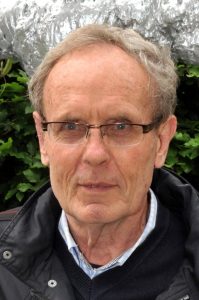
February 03, 2025
On January 8th, 2025, Jaap J. Ten Bosch passed away at home in Roden, in the north of the Netherlands. Jaap ten Bosch was a long-standing member of ORCA, Honorary member for more than 25 years, and contributed to the organization and to the wider dental scientific community in a profound manner.
Jaap ten Bosch studied Physics in the nineteen fifties in Utrecht in the Netherlands, where he received his PhD-diploma in 1967. Already during his studies, he came into contact with dentistry. After a year in the USA (Oak Ridge, Tennessee), he moved to the University of Groningen in 1971 where he stayed for the rest of his career as a Professor of Dental Physics.
His main focus in research was tissue optics, and he performed groundbreaking studies in the field of interaction of tooth tissues with light. His work has been cited in more than 50 patents, and has provided the foundation for diagnostic methods and instruments based on absorption and scattering of light, and fluorescence. Even though Jaap ten Bosch was not a dentist, he was passionate about multi-disciplinary research with the focus on clinical impact, and he thoroughly enjoyed working with dentist-researchers.
Within ORCA, Jaap was a well-known and respected figure. He commanded respect, with his tall figure and his broad knowledge and probing questions. Perhaps at first, young researchers might be a little intimidated by his commanding presence (I know I was, even as a colleague), but after getting to know him, this quickly turned into fond appreciation. Jaap was very much dedicated to improving the quality of research, through education and collaboration. In ORCA, this translated not only into very active discussions at the congress, but also into crucial contribution to the ORCA Summer Schools, where young researcher received training in caries research methodology. For his contribution to the Summer Schools in Eastern Europe, he received the ORCA Prize in 2000, the first Zsolnay Prize, which was a unique piece of porcelain in the shape of an owl. At that time, he also received a lifelong honorary membership of ORCA.
 Jaap ten Bosch, the unforgettable “Wise Owl” of ORCA will be much missed by his former students, colleagues and the wider ORCA community.
Jaap ten Bosch, the unforgettable “Wise Owl” of ORCA will be much missed by his former students, colleagues and the wider ORCA community.
On behalf of the Board of ORCA
Marie-Charlotte Huysmans
Monique van der Veen
Dr. Colin Dawes
 June 30, 2024
June 30, 2024
ORCA has lost a dear and highly respected colleague and world-renowned salivary researcher
It is with great sadness, we announce the death of Dr. Colin Dawes, at 88 years of age, on April 5, 2024, in Manitoba, Canada. Colin was a dear and highly respected colleague and an honorary member of ORCA. He made seminal scientific contributions to our understanding of salivary physiology and its importance to oral health, which was recognized by his receiving the ORCA Prize in 1989. His article “Physiological factors affecting salivary flow rate, oral sugar clearance, and the sensation of dry mouth in man” published in the Journal of Dental Research in 1987 has been cited over 900 times. Other impactful contributions include “Circadian rhythms in human salivary flow rate and composition” published in the Journal of Physiology in 1972 and “What is the critical pH and why does a tooth dissolve in acid?” published in the Journal Canadian Dental Association in 2003.
Dr. Colin Dawes received his dental training at the University of Manchester starting in 1953. During his training he received the Sydney Renshaw prize in physiology which led to him being the first dental student to take a one-year intercalated B.Sc. in Physiology thanks to a Nuffield Foundation scholarship. In his final year of dental school, he was selected to spend one month at Newcastle University Dental School. As part of this short but life-changing experience, he spent four days in the laboratory of Professor Neil Jenkins, who was the leading oral biologist in Britain. This led him to pursue a Ph.D. in oral physiology working with Professor Jenkins. He initially focused on the inorganic composition of dental plaque including a study comparing the fluoride concentration in plaque from children living in very low and high fluoride areas. This experience shaped his appreciation of the importance of water fluoridation in caries prevention. He then turned his attention to studies on factors influencing the flow rate and composition of saliva, which was the start of his career-long pursuit of this understudied (at the time) but important area of oral health research.
When he finished his Ph.D. in 1962 there were no academic positions in oral biology available in the UK. Through his networking with Dr. Finn Brudevold from Forsythe in Boston who was a visitor at Professor Jenkins laboratory, he was able to obtain a two-year post-doctoral position with Professor Jim Shaw at the Harvard School of Dental Medicine, where he studied proteins in human saliva as well as rat caries. This led to him applying for a position at the relatively new Dental School at the University of Manitoba in Winnipeg, Canada 1964, where he was appointed an Associate Professor and promoted to Full Professor in 1972. A very productive period followed where he studied normal physiological variables influencing salivary flow rate and composition, including duration of stimulation, the nature of the stimulus, circadian rhythms and exercise that was mainly funded by the Canadian Medical Research Council.
Dr. Dawes retired in 2004 but continued with academic pursuits as a member of an international group chosen by the World Workshop on Oral Medicine VI, which produced five publications related to salivary dysfunction. Over his career he was invited to give 221 lectures on his research in 27 different countries. He served as Editor of the Journal of Dental Research 1983-93, during which he edited 3,500 manuscripts for publication.
He regularly attended the IADR and ORCA meetings, where I had the privilege of benefiting from his mentorship and learning from his deep knowledge of salivary physiology. He will be remembered and cherished for his kindness, wonderful dry sense of humor and amazing intellect. Our thoughts are with his family and friends.
Domenick Zero on behalf of the ORCA board and the whole ORCA family
Professor Gunnar Rølla
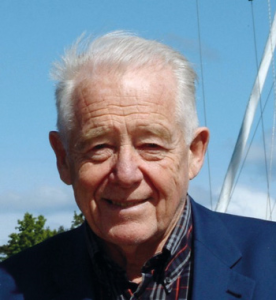 September 5, 2023
September 5, 2023
Gunnar Rølla, who was a central figure within Norwegian and international dentistry, passed away on 25 August 2017, 90 years old. Rølla trained as a dentist and received his doctoral degree at the University of Oslo (UiO) in 1967. From 1972 to 1975 he worked at the Dental faculty at the University in Aarhus, after which he was a researcher at the National Institutes of Health in Washington DC (1975-1976, and 1981-1982). He took office as professor of pedodontics and caries prophylaxis at Faculty of Dentistry, UiO in 1976, and retired in 1997.
He received the Norwegian King’s Medal of Merit in gold for his outstanding efforts with the field of dentistry, and in 2010, he was appointed to Knight of the 1st class of the Royal Order Norwegian Order of St. Olav for his significant and groundbreaking research in preventive caries treatment and oral dentistry. Gunnar Rølla was honorary doctor at both Karolinska Institutet in Stockholm, and at Umeå University.
Gunnar Rølla was a regular attender at international dental congresses not least ORCA meetings, and hosted the 1986 ORCA meeting at Ullensvang in the Hardanger area in Norway. A significant scientific production and a wide international contact network is reflected in his 120 co-authors from many countries. He participated regularly at and always had clear, direct, and analytical comments. His knowledge and ability to analyze biological mechanisms led to important breakthroughs in several areas in protein chemistry, fluorides mechanism of action, development of antibacterials, and later, on how implant materials can be integrated.
On behalf of the ORCA Board and the whole ORCA family
Professor Klaus G. G. König
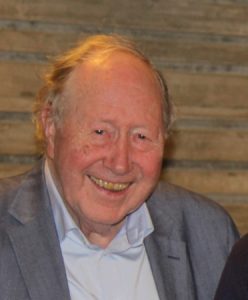 February 21, 2022
February 21, 2022
A gentle giant of Cariology has passed away.
On Saturday February 12th 2022 Emeritus Professor Klaus König, Honorary member of ORCA, passed away in Nijmegen, the Netherlands. Professor König has been of great importance to ORCA, as editor of the organisation’s journals, firstly Advances in Fluorine Research and Caries Prevention between 1964 and 1967 and later Caries Research from 1970 until 1987, and towards the end of his prolific career serving as president from 1991 to 1993.
Klaus König was born in 1931 in Nürnberg, Germany. After dental school and a dr. med. dent. degree in Würzburg, he moved to Zürich in Switzerland where he carried out the research work leading to his PhD degree (dr. habil.) with professor Mühlemann. This is where his scientific work on caries prevention started, with seminal studies on caries development and prevention in rats. In 1969 he was appointed Professor of Preventive Dentistry at the then Catholic University Nijmegen. In 1970 this was changed to include also Dental Public Health, reflecting his advisory role in health policy development.
Important contributions he made to dental health in the Netherlands included setting up a dental health monitoring project in schoolchildren and developing a health education curriculum for primary school children. He was a long time board member and served as chairman of the Dutch Ivory Cross, an association devoted to promoting dental health, and was instrumental in the development and implementation of the fluoride advice that has been the standard for oral health professionals since 1970. It is safe to say that he could claim partial credit for the reduction of caries prevalence in Dutch children since the 1970ies.
The academic work of Klaus König encompasses more than 300 papers in scientific journals, book chapters, with an emphasis on the role of nutrition and fluoride. However, his legacy and impact is much broader than the research he did. He was dedicated to education, and was a co-founder and president of the Association for Dental Education in Europe, and also served as president of the EU Advisory Committee on Dental education between 1991 and 1994. In Nijmegen he served as Dean of Dentistry and member of the Board of the Medical Faculty.
As a dental student, I was fortunate enough to be taught by professor König, and he was one of the most inspiring teachers I met. His friendly and supportive personality, his encyclopaedic knowledge of the literature and his never-ending drive to make a difference for the dental health of people, whether they be young or old, in the Netherlands, Europe or the world, made a lasting impression on all who crossed his path.
ORCA and the dental academic community have lost a valued member, and will remember him with gratitude, admiration and fondness. Our thoughts are with his family and friends.
Marie-Charlotte Huysmans on behalf of the ORCA Board and the whole ORCA family
Dr. George K. Stookey

January 13, 2022
ORCA has lost a great supporter and friend, world-renowned scientist, and strong promoter of cariology research and training in the USA and worldwide
Dr. George K. Stookey, Professor Emeritus at Indiana University, USA passed away at 86 years of age on January 5, 2022. Throughout his career he was a great friend and strong supporter of the ORCA family. In fact, he organized the second ever ORCA meeting outside of Europe, which was successfully held in Indianapolis, USA in 2005. In 2007 he was recognized for his caries research accomplishments by ORCA with the ORCA-Zsolnay Prize for research in Cariology.
Dr. Stookey was born in 1935 in Indiana, USA. After receiving Bachelor of Science, MSD and PhD degrees from Indiana University (IU), he spent his long and prestigious academic career on the faculty at the IU School of Dentistry. He got his start in the mid-1950s as a young graduate in the lab of Dr. Joseph Muhler, whose research with chemistry professors Harry Day and William Nebergall led to the development of the first successful stannous fluoride formula, which became the caries-preventing active ingredient in Crest toothpaste in the mid 20th century. His successful research career focused on topics such as efficacy of fluoride products, fluoride pharmacology, strategies for calculus prevention, and assessment of technologies for the early detection of dental caries lesions. At IU he established and served for many decades as associate director (1974-1981) and then director (1981-1999) of the Oral Health Research Institute (OHRI), attracting significant amount of funding in support of caries research from national and international sources as well as industry. He also organized the Indiana Conference series of Cariology-related meetings in support of caries research. In addition, he developed one of the most successful cariology training programs in the USA by personally selecting and inviting numerous individuals from all around the world to join his team at the OHRI and train in laboratory and clinical caries research. Attending and participating in ORCA was a must. Many of his students and post-doctoral trainees currently hold prestigious positions around the world continuing to promote his principles of excellence in caries education, training and research.
During his successful academic career he also served as Associate Dean for Research, Acting Dean of the IU School of Dentistry, and Executive Associate Dean, with his successes leading to the recognition of Distinguished Professor in 1998. After his retirement from IU in 2001, he became president and CEO of Therametric Technologies, Inc. to continue his passion for cariology research. He has left us with nearly 300 publications, conducted almost 400 presentations at scientific meetings, and made contributions to dozens of textbooks. His commitment to dental research earned him numerous awards beyond ORCA, including the International Association for Dental Research (IADR) Distinguished Scientist Award for Dental Caries Research (2002); the IADR E. W. Borrow Memorial Award (2005); the American Dental Association William J. Gies Award (2017) for his innovation in dental education, and the IU Bicentennial Medal (2021).
Personally, for many of us who had the honor and privilege to know him and work with him, Dr. Stookey opened the world of caries research to us, introduced us to ORCA and to important cariologists worldwide, helped support our training, served as mentor and teacher, and an inspiration and role model.
ORCA, the USA, and the world have lost an outstanding researcher, a fantastic mentor and teacher, a true gentleman, and an unconditional supporter and friend. We will deeply miss him. Our hearts are with his family and friends.
Margherita Fontana on behalf of the ORCA board and the whole ORCA family
Prof. Dr. Dr. h. c. mult. Walter Künzel
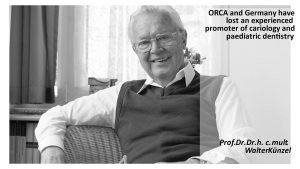 July 9, 2021
July 9, 2021
ORCA and Germany have lost an experienced promoter of cariology and pediatric dentistry
On the 3rd of April 2021 our long-standing member Prof. Dr. Dr. h. c. mult. Walter Künzel passed away at the age of 92 years. Walter Künzel was the founding father of paediatric dentistry, prevention and cariology in Germany and he is one of the few dental professional with an own Wikipedia article (https://de.wikipedia.org/wiki/Walter_Künzel). He was lucky to be only 17 years of age at the end of the World War II which saved him from major political or war activities. Starting a career in a destroyed Europe at the end of the World War II had major difficulties, but also the chance for change; Walter Künzel saw and pursued those opportunities extremely successfully.
Being born in Königsgrätz/Bohemia, he had to move into the new German borders which meant studying in East Berlin. After graduation, he stayed at the Humboldt University and – instead of following the tradition of technical dentistry – he started to concentrate on preventive approaches, especially in children. Following the success of water fluoridation in the US and the centralistic approach of a socialist country, he started a series of studies on implementing caries prevention on a population level via water fluoridation starting in Karl-Marx-Stadt/Chemnitz already in 1959 followed by long-term epidemiologic surveys. It was an incredible achievement to initiate a nation-wide preventive programme in post-war East Germany. Together with Thomas Marthaler, Klaus König and many others, he was an ORCA pioneer in the field of caries prevention and systematic international research and standards. Very quickly he finished his “habilitation” in Berlin in 1962, was promoted to a lecturer and he was awarded a full professorship and head of Department for Restorative Dentistry at the University of Leipzig in 1964. His heart was beating for paediatric dentistry, and especially for the promotion of healthy teeth on a national level. He was able to initiate the specialization in paediatric dentistry which led to the foundation of departments for paediatric dentistry at all universities in East Germany. Thus, he was also the founding president of the (East) German Society for Paediatric Dentistry already in 1969, while in the much more affluent West Germany, paediatric dentistry was never a structured specialization, and only a working group within restorative dentistry.
Walter Künzel was also the leading figure to internationalization of the dental sciences in the GDR (German Democratic Republic/socialist East Germany). In spite of working in a heavily controlled, authoritarian socialist country with limited resources, he managed to be a stronghold for ORCA, starting at the advisory board in 1967, with a congress in 1972 in Leipzig and 1981 in Erfurt, be ORCA president in 1980 and 1981 as well as initiating an exchange programme with John Arnold Weatherell/Leeds University across the iron curtain. Since 1973 he was an appointed member of a WHO expert group and Director of the Erfurt WHO Collaborative Center “Prevention of Oral Diseases” between 1983 and 1997.
These highly professional endeavours resulted in the first German chair and head of the Department for Preventive Dentistry at the Medical Academie Erfurt (MAE). In spite of the many cooperations with socialistic state officials, his high personal integrity was proven as he remained director of this department even after the democratic revolution in East German and was the first freely elected rector of the whole MAE until 1993. He also embraced German unification and worked actively in establishing the high international standards in cariology, preventive and pediatric dentistry for all Germany. The East German expertise led to the compulsory introduction of paediatric dentistry into the undergraduate curriculum also in West German universities after unification.
Thus, ORCA and Germany have lost an outstanding innovator and facilitator for a professional, international, science- and community-based approach in cariology. Our hearts are with his wife, family and friends.
Christian Splieth on behalf of the ORCA board and the whole ORCA family
Prof. Dr. Thomas Marthaler
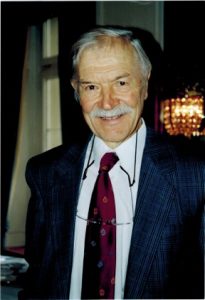 November 22, 2020
November 22, 2020
ORCA has lost one of its pioneers
On 13th of November 2020 our long-standing Swiss member Prof. Dr. Thomas Marthaler passed away at the age of 91 years. From very early on, Tomi Marthaler, as many friends called him, took an international and scientific approach to dentistry, spending the year after his graduation in the USA. Back in Switzerland, he combined working in the family practice with scientific work at the University of Zurich. Like many other pioneers in cariology, he was driven by the question of how to prevent the enormous burden of dental caries in many highly developed countries, instead of treating the damage caries caused. Switzerland was definitely a prime place for this in the 1950s, when ORCA was also founded.
Very systematically, Professor Marthaler found partners in the Swiss School Dental Services, developed a sound epidemiological base and analysed the influence of dietary factors in the process of caries which was not fully understood at that time. The great breakthrough occurred when many researchers concentrated on the caries-preventive effect of fluorides, which was one of the founding topics of ORCA.
Thomas Marthaler examined the properties of amine fluorides and played an important role their regular application in Swiss schools. This very simple, but systematic approach led to an incredible caries decline of over 90% and it was an outstanding success for caries research with its epidemiologic, basic science and community dentistry branches. Thus Thomas Marthaler set an example for young researchers and caries prevention in many other countries. Modern caries prevention improved the quality of life of whole populations and countries and Thomas Marthaler helped to make this possible. ORCA acknowledged these achievements by awarding him the Junior Rolex Prize in 1966. He was part of the international ORCA family presenting their current research at the annual conferences and enriching the evening event with a group of very vocal entertainers.
In Switzerland the outstanding achievements were rewarded with an “Außerordentliche Professur” meaning an “extraordinary” Professorship for Oral Epidemiology and Preventive Dentistry at the University of Zurich. In a network with other colleagues such as Hans Mühlemann, Klaus König, who was actually called his preventive twin brother, and Klaus Rateitschak Zurich became one of the leading centres for preventive and biologically-based dentistry, both in cariology and periodontology. They developed the idea and regulations for labelling sweets as “tooth-friendly”, a logo used in many countries. He was also involved in spreading the idea of fluoridated salt as a population-wide preventive approach. Very quickly, his endeavours became a benchmark for other activities in caries prevention, he initiated international comparison for the caries decline published in Caries Research and he also served as adviser to WHO and the American CDC. In appreciation, he became an Honorary Member of ORCA after his retirement.
Thus, ORCA has lost a true member and example for scientific and humanitarian engagement in cariology. Our hearts are with his family and friends.
Christian Splieth on behalf of the ORCA board and the whole ORCA family
Please note that SWISS DENT published a special issue in his honor in English in early 2022. You can download this issue here.




